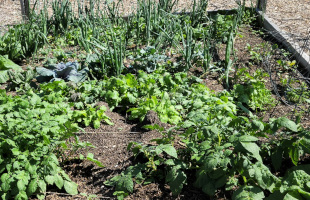
Spinach likes cool weather. It has grown in popularity and more and more people are planting it. However, it is somewhat temperamental to grow. Spinach will tolerate temperatures as low as 20 degrees but bolts and produces seed when it gets very warm. Hence, it must be planted early in the spring or in a fall garden.
Hard to Germinate
Spinach does reach maturity quickly, in 37 to 45 days. The leaves can be harvested and the plant will put out more leaves, so it produces well. The problem is getting it to germinate. It germinates at temperatures of 38 to 40, and as high as 60 degrees. Any higher and it doesn’t germinate well. In north-central Texas, that can be a problem. Some years the soil temperature is too high for the seed to germinate well. Other years, it grows fine.
Needs Alkaline Soil
Spinach is very sensitive to acid in the soil. If the soil pH is lower than 6.8, it doesn’t germinate well, doesn’t grow well, and generally refuses to cooperate. You will have to lime the soil to raise the pH if you want to grow spinach there.
Plant in a Block
Plant your seeds at a depth of 1/2 inch. You can plant them in more of a bed than a row to increase the number of leaves you harvest.
Fertilizing
Spinach needs a lot of nitrogen fertilizer, and probably phosphorus and potassium, depending on your soil. A soil test will tell you what you need to fertilize spinach.
Sometimes spinach has a boron deficiency. If the roots are dark and it has small, flattened, yellow leaves, you need to add boron. Do not add boron unless the spinach shows a deficiency.
Watering
Spinach requires the usual amount of water for vegetables. There would be an inch of water two or three times a week while it is growing. You want the bed moist but not squishy.
Downy Mildew a Problem
Downy mildew is a major disease of spinach. You can plant varieties that are resistant to downy mildew, but you also need to have good cultural practices. That means watering from drip irrigation or early in the morning, so the leaves either stay dry or dry quickly. Watering in the evening will increase the chances of downy mildew.
Sanitation In The Field
One other thing about spinach. Sanitation is very important. The E. coli outbreak that was so serious and killed people was caused when feral hogs tracked manure from a dairy farm into a spinach field. The spinach took in the bacteria with the irrigation water. So even washing the spinach did not help, because the E. coli was in the tissue of the plant. Be sure you keep all animals out of your garden to prevent this kind of thing.

Want to learn to garden? My first attempt at gardening ended up in failure. The weeds took over and squeezed the vegetables out. I was very frustrated by this waste of good seed, time, and money. So I became a master gardener and spent a lot of time helping other people avoid or overcome problems in their garden.
In order to help others garden successfully, I have written a book, Vegetable Gardening from the Ground Up, available in an ebook or a paperback from Amazon. It is also in Kindle Unlimited.


Im about to embark in planting green vegetables this year including spinach. Thanks for the information!
You have provided some serious misinformation… lime is used to raise the PH of soil that is too acidic not lower it as stated in your blog. A PH of 7 is neutral, above that is alkaline, below that is acidic. Most reputable sources recommend a PH of 6.5 to 7 for spinach. I have grown it very successfully at PH of 6.0-6.5. The amount of boron you recommend is crazy; boron deficient soil is usually amended at the rate of 1-5 pounds PER ACRE depending on the crop. A few tablespoons of borax would be sufficient for your average size spinach bed.
The statement about pH was poorly phrased and I have clarified it. The amount of boron recommended has changed and I have removed any recommendation. Contact your Extension Agent if your greens appear to have a boron deficiency.